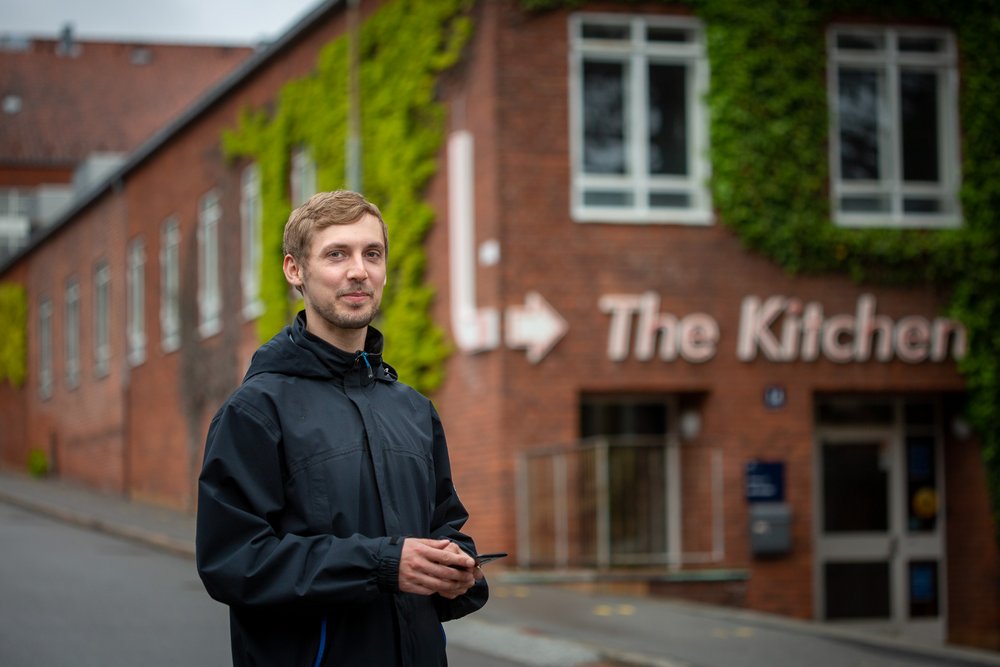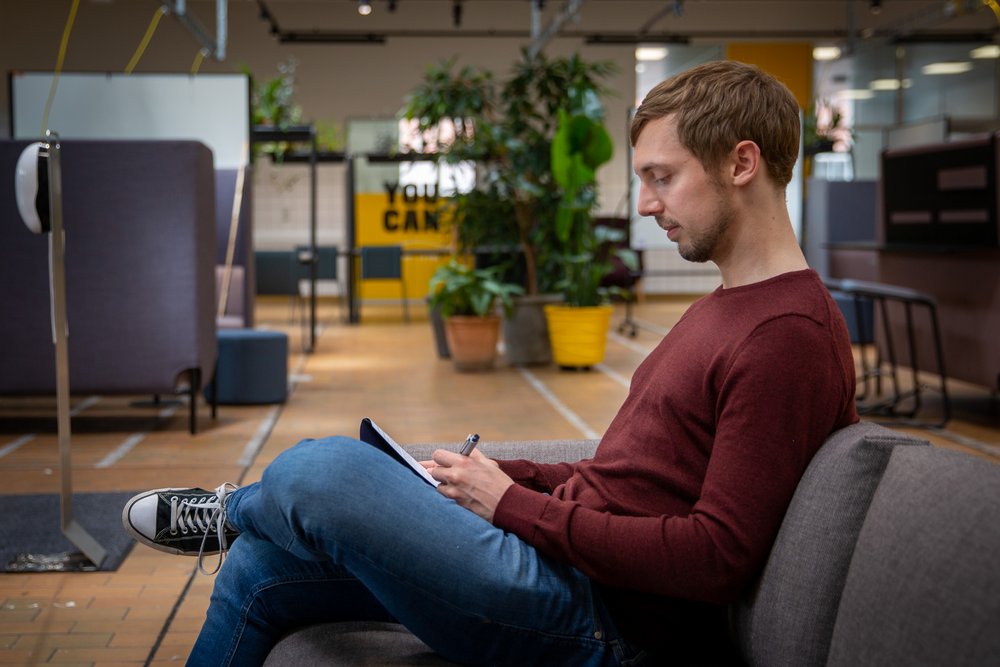Christoffer and his friends had a good idea; an idea that was so good that Denmark's richest man bought part of the company.
A digital welcome to shopping centres. That’s what the Aarhus IT company Emplate specialises in. Conceived in the study environment around the Department of Computer Science at Aarhus University and now ready to conquer the world.
By Jacob Staehelin
An event in autumn 2020 was not much different from so many others at The Kitchen: Aarhus University's meeting place for entrepreneurs. Students and new start-ups had been invited to present the ideas and thoughts behind companies they either dreamed of founding or had already launched.
Among the audience was a representative from Heartland, an investment company representing the risk-willing part of a gigantic fortune. The fortune belongs to Denmark's richest man, Anders Holch Povlsen, owner of Bestseller and a major investor in everything from Scottish rural areas to e-commerce giants such as Boozt and Zalando, and that fortune is constantly on the hunt for new investment opportunities.
In front of the stage was one of the co-founders of the Aarhus-based IT company, Emplate. The company was a fast-growing success story and its owners had enough experience to realise that they would have need a money-man on board too, if they were to continue at the pace they wanted.
Christoffer Hauthorn remembers what followed. He is one of the five owners of Emplate, and in summer 2020 he graduated with his Master's degree from the Department of Computer Science.
"We had an idea that they’d show up. And this made sure that we showed up. But the speed at which it all happened was still crazy, he remembers.

A couple of weeks earlier, the five owners presented the board with their dream scenarios for investors, and yes indeed, Anders Holch Povlsen and Heartland were at the top. The plan was made to happen, for just a few days after the presentation in The Kitchen, Heartland called Christoffer Hauthorn and the rest of the owners, and with insane speed, six weeks later there was a solid amount in Emplate’s bank account.
"It was a rather intensive process, but it was much faster than we imagined. We’re satisfied, because it gives us an opportunity to accelerate things," says Christoffer Hauthorn.
Let’s rewind to almost six years ago. And move more than 100 kilometres west of Aarhus, to the town of Herning. This is where a section of Aarhus University offering the Bachelor of Engineering programme in business development is located.
This is also where the seed of the idea that Anders Holck fell in love with was planted by six new students. Christoffer Hauthorn is one of them, and in the classic way of engineers, the group became deeply fascinated by what iBeacons can do. These are small Bluetooth transmitters that can interact with telephones, for example, and that only need a small battery to power them.
"We actually did the reverse of so many other entrepreneurs. You’re normally faced with a problem and then find the technology to solve the problem: But we had the technology and had to find a problem it could solve,” says Christoffer Hauthorn.
One of the first-year study projects involved the Herning Museum of Contemporary Art. The group installed the small transmitters, also known as 'beacons', around the museum, and they constructed an app for mobile phones. When guests at the museum approached a transmitter, new information popped up that matched the user's location. The management at the museum was so enthusiastic about the product that they immediately asked what it would cost to have it installed permanently.
"We actually did the reverse of so many other entrepreneurs. You’re normally faced with a problem and then find the technology to solve the problem: But we had the technology and had to find a problem it could solve."
Christoffer Hauthorn
"Then we had to go home and talk about what the heck we should charge for it. And find out whether we wanted to proceed. We decided very quickly that we did," says Christoffer Hauthorn.
The museum accepted the group’s price, and now they started developing the idea in earnest. The way forward was also in Herning, because the city also has a shopping centre. Back in 2015, marketing at the centre consisted mainly of physical newspapers with special offers that were distributed to households. However, the centre's marketing was challenged when people increasingly stuck ‘no advertising’ stickers on their mailboxes. To start with, they simply expanded the radius for delivering the newspapers, but gradually the radius extended so far away from Herning that it no longer made any sense.
One of the original group of entrepreneurial students wanted to continue studying in the USA, and the small group remaining convinced the shopping centre to try their solution instead of traditional marketing. And this was the start of a very successful process. It turned out that people continued using their app, which worked using the small transmitters installed around the Herning Centret shopping centre. The individual shops could get in direct contact with customers, who could transfer their ‘no advertising' stickers to the personalised app, so that only the shops they chose themselves could send messages.
Between projects for the newly started company, which they named Emplate, Christoffer Hauthorn had had time to read the study plan for the study programme in Herning. And he was sorry to see that technical subjects took second place to the more commercial courses. He took the consequences of this and changed to the Department of Computer Science at Aarhus University, where he began to study IT Product Development. This was crucial for Emplate's future, because it meant that Christoffer Hauthorn could acquire the theoretical knowledge he needed to translate into an actual product.
"This made my change of programme a perfect fit," says Christoffer Hauthorn, who is in charge of technology at Emplate. "I'm responsible for designing and developing the software we need. And that's exactly what you can do at Computer Science. I had a lot of freedom of choice for my Master's, and I could specialise in a direction that made most sense for the company," says Christoffer Hauthorn, who also made use of the Dual Career scheme, which helps students with advice and to seek exemptions to extend their Master's programmes for one year.
"I'm responsible for designing and developing the software we need. And that's exactly what you can do at Computer Science. I had a lot of freedom of choice for my Master's, and I could specialise in a direction that made most sense for the company."
Christoffer Hauthorn
As the five co-founders began to spend more and more time on their work with the company, they also decided to relocate physically to Aarhus. Most recently, Emplate was based in Level 2, an office environment for former students from Aarhus University. This provides newly started entrepreneurs with affordable office space and means they still have an affiliation with the communities from the university environment, from where several employees are recruited.
The shopping centre in Herning was not the only customer. Today, a large number of the largest shopping centres in Denmark subscribe to services from Emplate. Several from abroad have followed suit, and this is where the future lies. Especially in countries east of the old Iron Curtain.
"There is still a great deal of faith in retail in Eastern Europe, and shopping centres rather than retail streets are still being built. The advantage for us is that the shopping centres currently being built are digital from the very beginning. They know that a digital welcome for customers is important. And that means they often look around for someone to help them," says Christoffer Hauthorn.
So far, the company has spent everything it earned on reinvestment in new recruitment to make the product as competitive as possible. New programmers have been hired and processes have been streamlined, so the generic app can now be adapted relatively quickly to new customers. Therefore, future focus will be on sales, where unfortunately traditional trade fairs have been quiet during the corona pandemic.
However, recognition of the limitations if you choose astute business acumen as a development strategy, made the five owners think about getting an investor on board.
"We agreed that if we wanted things to go faster, we would have to spend money. We looked at others who had received a financial injection, and we thought we ought to be able to do the same," says Christoffer Hauthorn.
And that brought us back to the slide shown on that autumn evening about six months ago in The Kitchen. The slide that opened the door to Anders Holch Povlsen and his wallet, and which now means that our expansion can really accelerate.
The investment did not mean that the five founders could put their feet up, light a cigar and pour a cocktail. The investment from Denmark’s richest man is in an idea and just as much in the people who will get the idea to grow. And grow it must.
“The development curve we’ve drawn is so steep that it’s starting to be rather fun to have a part in a company with the sack of money we’ve received. It may well be that in three years we’ll have to expand even more and we’ll need new investment, but this isn’t the plan right now. And in fact, we’ll never need it if things go as we hope," says Christoffer Hauthorn.

“The development curve we’ve drawn is so steep that it’s starting to be rather fun to have a part in a company with the sack of money we’ve received."
Christoffer Hauthorn
They’re leaving the offices in Level 2 now, but Christoffer Hauthorn and the other four founders leave strong feelings behind them. They have tried to pay Aarhus University back by sharing their experiences with other students, by taking in interns, and by entering new networks, just as they themselves benefited from the frameworks as aspiring entrepreneurs. Entrepreneurs who came up with an idea that new students at the Department of Computer Science have taken such great interest in, that they share it in Facebook groups.
“The Storcenter Nord shopping centre is right opposite the Department of Computer Science. And I’m always moved when I see a post that they remind each other to download the app for the centre, because they can collect points that they can exchange for small gifts or cheap food. And they have no idea that its our app," says Christoffer Hauthorn with a laugh.